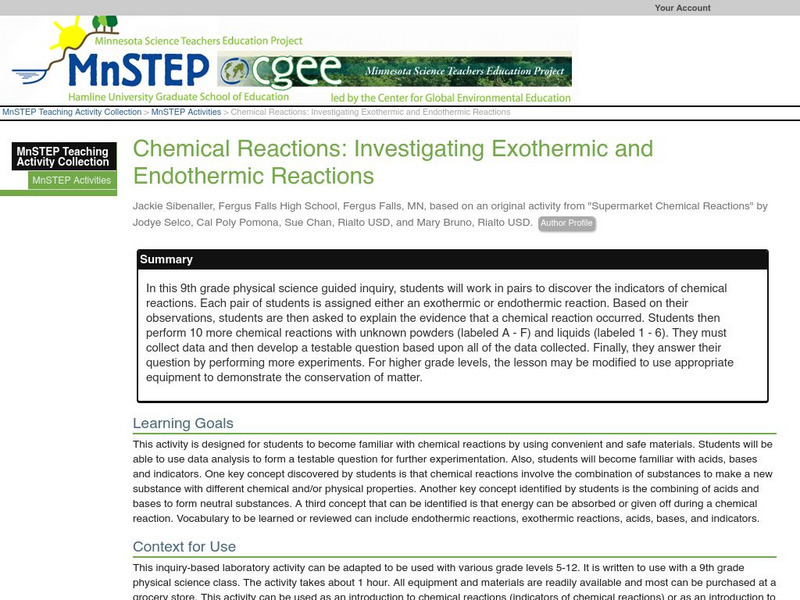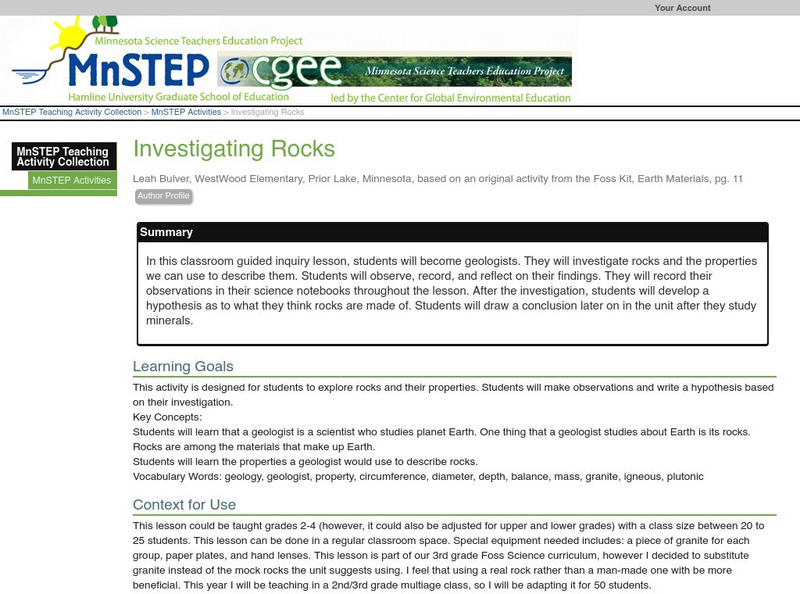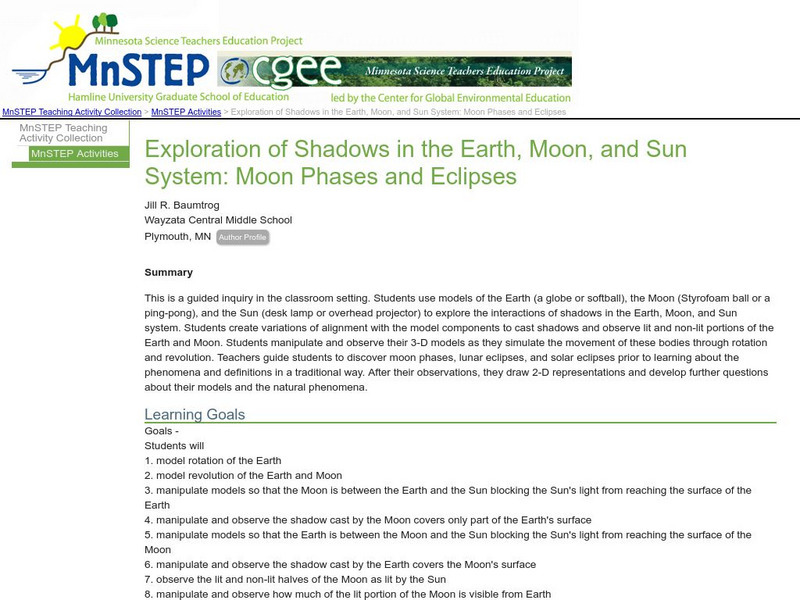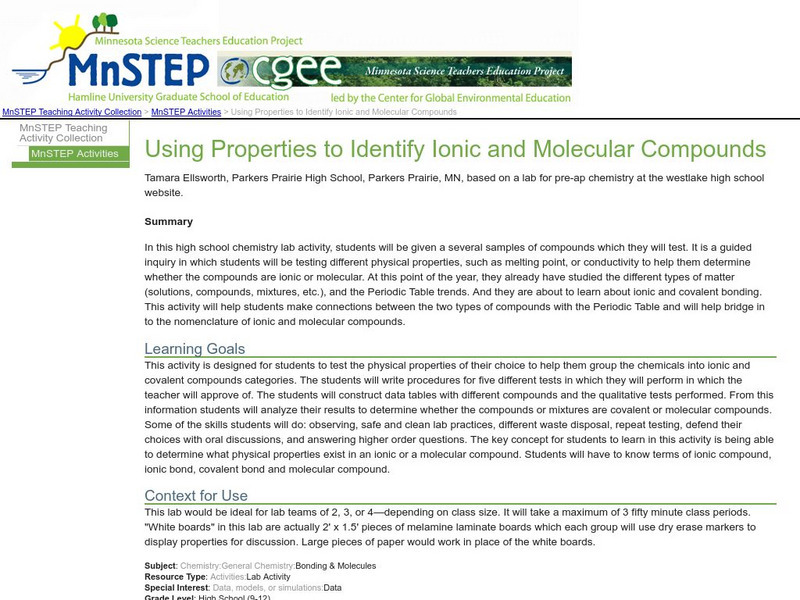Science Education Resource Center at Carleton College
Serc: Investigating Motion With Marbles
For this guided inquiry activity, students will use 2 marbles of different size and a box to investigate what makes the marbles move and what will cause the marbles to change speed and direction.
Science Education Resource Center at Carleton College
Serc: How Do Light Bulbs Work?
A guided inquiry that involves observation of the parts of a light bulb in a lab.
Science Education Resource Center at Carleton College
Serc: Chemical Reactions: Investigating Exothermic and Endothermic Reactions
In this 9th grade physical science guided inquiry, students will work in pairs to discover the indicators of chemical reactions. Each pair of students is assigned either an exothermic or endothermic reaction. Based on their observations,...
Science Education Resource Center at Carleton College
Serc: Boiling Water With Ice: Effect of Pressure on the Boiling Point of Water
For this activity, which is a discrepant event with guided inquiry, the teacher will go through the steps of boiling water with ice. Through the learners telling and recording WHAT is happening, the teacher is showing the students what...
Science Education Resource Center at Carleton College
Serc: Evaporation: Investigating Factors That Affect It
In this guided inquiry investigation, students examine conditions to see what affect these conditions have on evaporation rates.
Science Education Resource Center at Carleton College
Serc: Conservation of Momentum Using Rollerblades and a Medicine Ball
In this guided inquiry demonstration, a person on rollerblades and a medicine ball are used to teach the concept of conservation of momentum. Various sorts of collisions are used to show how momentum is conserved within a system.
Science Education Resource Center at Carleton College
Serc: Using Macroscale Measurements to Determine Microscale Quantities
In this guided inquiry activity, young scholars will see how we can obtain information about the atomic world by making macro-scale calculations. Students will also use dimensional analysis to manipulate their measurements to achieve the...
Science Education Resource Center at Carleton College
Serc: Investigating Rocks
In this classroom guided inquiry lesson, students will become geologists. They will investigate rocks and the properties we can use to describe them. Students will observe, record, and reflect on their findings. They will record their...
Science Education Resource Center at Carleton College
Serc: Exploration of Shadows: Earth, Moon, Sun System: Moon Phases Eclipses
A guided inquiry where students participate in the simulation of moon phases and eclipses.
Science Education Resource Center at Carleton College
Serc: Using Properties to Identify Ionic and Molecular Compounds
A guided inquiry in which young scholars test different physical properties, such as melting point or conductivity, to help them determine whether the compounds are ionic or molecular.
Science Education Resource Center at Carleton College
Serc: Investigating Soil Which Soil Help Plants Grow?
In this guided inquiry lab, students will investigate what type of soil let plants/grasses grow the best. Students will answer the question by conducting an experiment using five different soils found in our area, school soil, potting...
Science Education Resource Center at Carleton College
Serc: Investigating Soils
In this guided inquiry middle schoolers will specify soil types by using various methods of determining soil textures and analyze them with a soil triangle. This activity is a laboratory investigation where students gather data on soil...
Science Education Resource Center at Carleton College
Serc: Flow Characteristics of the Crow River
Students make observations of a local river, and then formulate a question. Then, through guided inquiry, construct, conduct, and collect data on a question they wish to research. Students keep a field journal of their observations,...
Alabama Learning Exchange
Alex: Types of Chemical Reactions and Predicting Products
The guided inquiry activity enables students to identify the five basic types of reactions - synthesis or composition, decomposition, combustion, single replacement and double replacement. Students will also begin to predict the products...
Alabama Learning Exchange
Alex: Balancing Chemical Reactions
Students will participate in a guided inquiry activity using manipulatives to learn how to balance chemical reactions. This activity was developed in cooperation with Michelle Holdbrooks at Thompson High School...
Alabama Learning Exchange
Alex: What's the Matter: Concentration Game
What's the Matter? is a guided inquiry lesson on classification of matter, physical and chemical properties, and physical and chemical changes. There are two parts to this lesson: (a) concentration game for definitions and (b)...
Center for Innovation in Engineering and Science Education, Stevens Institute of Technology
Ciese Collaborative Projects: Bucket Buddies: Environmental Study
Bucket Buddies is an opportunity for young scholars to participate in a world-wide environmental study. By identifying organisms in pond water, participating classes can compare their findings, and look for relationships in data. In...
BSCS Science Learning
Bscs: A Medical Mystery
Students are immersed in an online environment that challenges them to solve the medical mystery: "What's Wrong with M'Kenna?" This resource includes the complete middle school science curriculum unit, a teacher's guide, and an online...
Science Education Resource Center at Carleton College
Serc: Mn Step: The Five Senses
An activity where students try to identify objects using only their senses, with and without a blindfold. The lesson plan is also appropriate for special needs or ELL students in higher grades.
BSCS Science Learning
Bscs: Budburst Fall Colors
In this Inquiry, students engage in a debate between two characters about when a bed-and-breakfast (B&B) should have a fall leaf-peeping special to maximize the guest experience. Students are introduced to Budburst, a citizen science...
BSCS Science Learning
Bscs: Globe at Night Dark Skies
In this inquiry, students predict the best place to stargaze in Arizona based on the brightness of the night sky. Students are introduced to the concept of light pollution and Globe at Night, a global citizen science project in which...
BSCS Science Learning
Bscs: Global Night Sky Comparison
This inquiry invites students to investigate human impacts on the environment. Specifically, students will examine the relationship between human population, light pollution, and how brightly celestial objects like stars appear in the...
BSCS Science Learning
Bscs: Frog Symphony
This inquiry focuses on analyzing spatial and temporal data for frog calls to determine the best time of day and location to hear a symphony of frogs. Click on the link for teaching guides and handouts.
BSCS Science Learning
Bscs: Chesapeake Bay Algal Blooms
In this inquiry, students engage with mapping data to determine what kind of land coverage is contributing the most to harmful algal blooms in the Chesapeake Bay Watershed. Click on the link for teacher resources for teaching guides and...
Other popular searches
- Guided Inquiry Lessons
- Ecosystems Guided Inquiry
- Guided Inquiry Chemistry
- Guided Inquiry Moon
- Guided Inquiry Science
- Proteins Guided Inquiry
- Bats Guided Inquiry
- Guided Inquiry Lesson Plans
- Economics Guided Inquiry
- Guided Inquiry Sound Travel




















